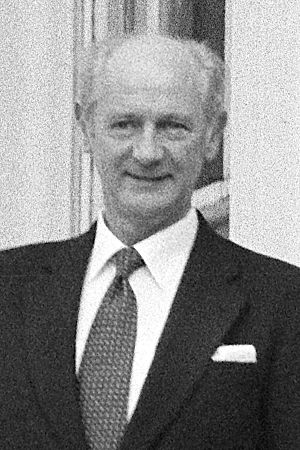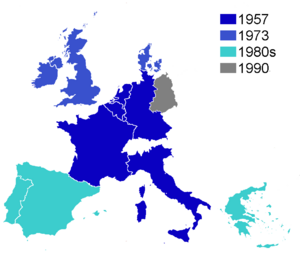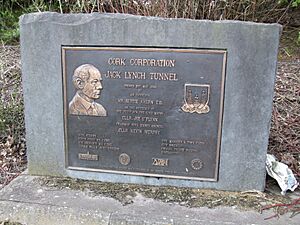Jack Lynch facts for kids
Quick facts for kids
Jack Lynch
|
|
|---|---|

Lynch in 1979
|
|
| 5th Taoiseach | |
| In office 5 July 1977 – 11 December 1979 |
|
| President | Patrick Hillery |
| Tánaiste | George Colley |
| Preceded by | Liam Cosgrave |
| Succeeded by | Charles Haughey |
| In office 10 November 1966 – 14 March 1973 |
|
| President | Éamon de Valera |
| Tánaiste | |
| Preceded by | Seán Lemass |
| Succeeded by | Liam Cosgrave |
| Leader of the Opposition | |
| In office 14 March 1973 – 5 July 1977 |
|
| President | Éamon de Valera Erskine H. Childers Cearbhall Ó Dálaigh Patrick Hillery |
| Taoiseach | Liam Cosgrave |
| Preceded by | Liam Cosgrave |
| Succeeded by | Garret FitzGerald |
| Leader of Fianna Fáil | |
| In office 10 November 1966 – 7 December 1979 |
|
| Deputy | Joseph Brennan George Colley |
| Preceded by | Seán Lemass |
| Succeeded by | Charles Haughey |
| Minister for Finance | |
| In office 21 April 1965 – 10 November 1966 |
|
| Taoiseach | Seán Lemass |
| Preceded by | James Ryan |
| Succeeded by | Charles Haughey |
| Minister for Industry and Commerce | |
| In office 23 June 1959 – 21 April 1965 |
|
| Taoiseach | Seán Lemass |
| Preceded by | Patrick Hillery |
| Succeeded by | Charles Haughey |
| Minister for Education | |
| In office 20 March 1957 – 23 June 1959 |
|
| Taoiseach | Éamon de Valera |
| Preceded by | Richard Mulcahy |
| Succeeded by | Patrick Hillery |
| Minister for the Gaeltacht | |
| In office 20 March 1957 – 26 June 1957 |
|
| Taoiseach | Seán Lemass |
| Preceded by | Patrick Lindsay |
| Succeeded by | Mícheál Ó Móráin |
| Parliamentary Secretary | |
| 1951–1954 | Government |
| 1951–1954 | Lands |
| Teachta Dála | |
| In office June 1977 – June 1981 |
|
| Constituency | Cork City |
| In office June 1969 – June 1977 |
|
| Constituency | Cork City North-West |
| In office February 1948 – June 1969 |
|
| Constituency | Cork Borough |
| Personal details | |
| Born |
John Mary Lynch
15 August 1917 Cork, Ireland |
| Died | 20 October 1999 (aged 82) Donnybrook, Dublin, Ireland |
| Resting place | St. Finbarr's Cemetery, Cork, Ireland |
| Political party | Fianna Fáil |
| Spouse |
Máirín O'Connor
(m. 1946) |
| Education |
|
| Alma mater | |
John Mary Lynch (born 15 August 1917 – died 20 October 1999), known as Jack Lynch, was a very important Irish politician. He served as the Taoiseach (Prime Minister) of Ireland twice: from 1966 to 1973 and again from 1977 to 1979. He was also the leader of the Fianna Fáil political party for many years. Before becoming a politician, Jack Lynch was a famous sportsman, excelling in both hurling and Gaelic football. Many people considered him one of Ireland's most popular politicians ever.
Contents
Early Life and Education
Jack Lynch was born on 15 August 1917 in Shandon, a part of Cork. He was the youngest of five boys and the fifth of seven children. When he was just thirteen, his mother passed away. His aunt, who had six children of her own, helped look after the family.
Jack went to school at St. Vincent's Convent and later at the famous North Monastery Christian Brothers School. After finishing school in 1936, he worked in Dublin for a short time. He then returned to Cork to work in the Circuit Court Office. Working in the court sparked his interest in law. In 1941, he started studying law at University College Cork at night. He later moved to Dublin to finish his law studies at King's Inns. In 1945, he became a barrister and decided to practice law in Cork.
In 1943, Jack met his future wife, Máirín O'Connor, while on holiday. They got married on 10 August 1946. They did not have any children. Máirín supported him throughout his political career, even though she was sometimes worried about it.
Amazing Sports Career
| Personal information | |||
|---|---|---|---|
| Sport | Dual player | ||
| Football Position: | Midfield | ||
| Hurling Position: | Half-back | ||
| Club(s) | |||
| Years | Club | ||
|
1934–1950
1934–1951 1943–1944 |
Glen Rovers St Nicholas' Civil Service |
||
| Club titles | |||
| Football | Hurling | ||
| Cork titles | 2 | 11 | |
| Inter-county(ies) | |||
| Years | County | Apps (scores) | |
|
1936–1950
1939–1949 |
Cork (H) Cork (F) |
42 (13–66) 14 (1–6) |
|
| Inter-county titles | |||
| Football | Hurling | ||
| Munster Titles | 2 | 6 | |
| All-Ireland Titles | 1 | 5 | |
From a young age, Jack Lynch was an amazing sportsman. He enjoyed many sports, but he was especially good at Gaelic football and hurling. He was known as a dual player because he played both sports at a high level.
Club Success
Jack played club hurling for the famous Glen Rovers club in Blackpool, Cork. He won two minor (underage) county championships in 1933 and 1934. In 1934, he won his first senior county hurling championship with Glen Rovers. This was the start of a record-breaking eight county titles in a row for the club, and for Jack. He later won three more county medals in 1948, 1949, and 1950.
He also played club Gaelic football for St. Nicholas, a sister club of Glen Rovers. He won two minor county football titles in 1932 and 1933. In 1938, he won a senior county football championship medal. He won another county football medal in 1941. While working in Dublin, he also won a Dublin Senior Football Championship title in 1944 with the Civil Service GAA team.
Inter-County Achievements
By the late 1930s, Jack Lynch was playing for both the senior hurling and senior football teams for Cork. In 1939, he made history by being the only player to captain both the inter-county football and hurling teams in the same year. That year, he won his first Munster hurling title.
He won five All-Ireland hurling titles with Cork. These wins happened in 1942, 1943, 1944, and 1946. In 1944, Cork became the first team to win four All-Ireland hurling titles in a row, and Jack was part of that historic team. In 1945, he won his only All-Ireland football medal with Cork. In 1946, he became the first player to win six consecutive senior All-Ireland medals (five in hurling and one in football).
Jack Lynch also won seven Munster hurling titles and three National Hurling League titles. In football, he won two Munster titles. He retired from inter-county hurling in 1950.
Sporting Honours
Jack Lynch is considered one of the greatest players in Gaelic games history. In 1984, he was named on the "Hurling Team of the Century." After he passed away in 1999, he was also named on the "Hurling Team of the Millennium." In 1981, he received an All-Time All Star Award to recognise his amazing career.
Becoming a Politician
Jack Lynch first got involved in politics in 1946 when his local Fianna Fáil group asked him to run for the Dáil (Irish Parliament). He said no at first because he felt he didn't have enough experience. However, he was interested in running in the next general election.
In February 1948, a general election was held. Jack Lynch ran for the Cork Borough area and won the most votes, becoming a Teachta Dála (TD), which is a member of the Dáil. Even though his party, Fianna Fáil, lost the election, Jack became a speechwriter and helper for the party leader, Éamon de Valera.
When Fianna Fáil returned to power in 1951, Jack was appointed as a Parliamentary Secretary. This meant he helped a government minister. He was responsible for areas where the Irish language was still widely spoken (the Gaeltacht).
After the 1957 election, Fianna Fáil was back in government. At 39, Jack Lynch became the youngest member of the government. He was made Minister for Education and also looked after the Gaeltacht for a short time. As Education Minister, he made important changes, like raising the school leaving age and allowing married women to work as teachers.
Minister for Industry and Commerce
In 1959, Seán Lemass became Taoiseach. Jack Lynch was promoted to Minister for Industry and Commerce. In this role, he worked closely with Lemass to help Ireland's economy grow. He was also good at solving disagreements between workers and businesses.
Minister for Finance
In 1965, Jack Lynch became Minister for Finance. This was a very important job because Lemass was preparing him to become the next Taoiseach. As Finance Minister, Jack gained a lot of experience in many different areas. He even went to London with Lemass to sign an important trade agreement with the United Kingdom.
Leading Ireland as Taoiseach (1966–1973)
In 1966, Seán Lemass retired as Taoiseach. There was a big competition to decide who would be the next leader of Fianna Fáil. Jack Lynch was chosen as a compromise candidate, meaning he was someone everyone could agree on. He won the leadership vote and became Taoiseach on 10 November 1966.
Some people thought he would only be Taoiseach for a short time, but Jack Lynch proved them wrong. He wanted to lead the country properly. He kept most of the previous government ministers but moved some to different jobs. He let his ministers manage their own departments, while he guided the government like a chairman. He continued the work of modernising Ireland that Lemass had started.
Northern Ireland and the Troubles
Northern Ireland became a very important issue during Jack Lynch's time as Taoiseach. He continued to try and improve relations between the Republic of Ireland and Northern Ireland. He met with the Prime Minister of Northern Ireland, Terence O'Neill, to build stronger links.
However, tensions in Northern Ireland grew, leading to "The Troubles" in 1969. Many people from Northern Ireland crossed the border into the Republic. Jack Lynch famously said that the Irish Government could "no longer stand by" while people suffered. This statement was seen by some as a hint that Ireland might get involved militarily, but the Irish Army was not ready for such a step. Lynch did not take military action. His government tried to get the United Nations to send a peacekeeping force to Northern Ireland.
A very sad event called Bloody Sunday happened in January 1972, where 14 unarmed civilians were killed by British soldiers. This caused strong anti-British feelings in Ireland, and the British Embassy in Dublin was burned. Despite these difficult times, the British Ambassador at the time praised Lynch for his courage and efforts to keep peace.
The Arms Crisis
Jack Lynch showed strong leadership during the "Arms crisis" in 1970. There were accusations that two government ministers, Neil Blaney and Charles Haughey, were involved in trying to illegally import arms for the Provisional IRA. Lynch acted decisively, sacking both ministers. This event caused deep divisions within his party but showed that Lynch was a strong leader.
Joining the EEC
One of the most important achievements of Jack Lynch's first term was Ireland joining the European Economic Community (EEC), which is now the European Union. He personally led the effort for Ireland to become a member. The Irish people voted strongly in favour of joining in a referendum. Ireland officially joined the EEC on 1 January 1973, along with the United Kingdom and Denmark. This was a huge step for Ireland's future.
Social Changes
During Lynch's first term, there were also many social improvements. In 1967, a scheme was introduced to help people who lost their jobs. In 1970, new benefits were brought in for women, including maternity insurance and support for deserted wives and unmarried mothers.
In 1967, free secondary education was introduced, along with free transport for students living far from school. In 1972, older people gained the right to free travel on public transport, and people eligible for free hospital care also got help with prescription costs.
In Opposition (1973–1977)
In 1973, Jack Lynch's government was defeated in a general election by a group of parties called the National Coalition, led by Liam Cosgrave. For the first time in sixteen years, Jack Lynch was no longer in power and became the Leader of the Opposition. However, he remained very popular, and many people still called him "the Real Taoiseach."
While in opposition, Jack Lynch helped his party, Fianna Fáil, win the presidential election in 1973 with their candidate, Erskine H. Childers. In 1975, he allowed Charles Haughey to return to the party's main team, which caused some discussion.
In 1977, the government called another election. Even though some changes were made to electoral areas that were supposed to help the government, Fianna Fáil won a huge victory. They gained an unprecedented twenty-seat majority in the Dáil. Jack Lynch himself received the most personal votes in the country.
Second Term as Taoiseach (1977–1979)
When Jack Lynch began his second term as Taoiseach, he decided he would not lead Fianna Fáil into another general election. He thought about retiring around January 1980. Because of this, and the party's large majority, some party members started to challenge his authority.
The Economy
In the 1977 election, Fianna Fáil promised many new economic changes. These included getting rid of car tax and local property taxes on homes. A new government department was created to boost the economy. While unemployment fell, the country's debt increased, and there were protests about rising costs and the 1979 oil crisis.
Party Challenges
In 1978, some members of the party openly disagreed with a new tax on farmers. This weakened the government's authority. There was also tension when a minister, Jim Gibbons, refused to vote for a Family Planning Bill. Jack Lynch did not remove him from the government, which further damaged his authority. A group of TDs also started to secretly support Charles Haughey to become the next leader.
Lynch's Resignation
In 1979, Jack Lynch realised his control over the party was slipping. His party did not do well in the first direct elections to the European Parliament in June. A long postal strike also caused public anger.
In August 1979, the Provisional IRA killed Earl Mountbatten and 18 British soldiers. This led to discussions with the new British Prime Minister, Margaret Thatcher, about security. A backbench TD, Síle de Valera, openly challenged Lynch's approach to Northern Ireland. This was embarrassing for Lynch.
After losing two important local elections in his home county of Cork in November, Jack Lynch decided to resign. He believed his chosen successor, George Colley, had enough support to win the leadership. However, Charles Haughey and his supporters had been preparing for months. Haughey narrowly won the leadership contest and became Taoiseach.
Jack Lynch remained a TD until he retired from politics in the 1981 general election.
Life After Politics
After retiring from politics, Jack Lynch joined the boards of several companies. He also travelled a lot. He was given the freedom of his home city of Cork. He continued to speak about political issues, especially supporting Desmond O'Malley when he was expelled from Fianna Fáil. Lynch was asked to become President of Ireland but he was not interested in the role.
In 1992, he had serious health problems, and in 1993, he had a stroke that affected his eyesight. After this, he stayed out of public life and remained at home with his wife, Máirín.
Jack Lynch continued to be honoured by various organisations, including the Gaelic Athletic Association. In 1999, the Jack Lynch Tunnel under the River Lee in Cork was named after him. A statue of him sitting on a bench was also put up in his childhood area of Blackpool, Cork, after his death.
Jack Lynch passed away on 20 October 1999, at the age of 82. He was given a state funeral, which was attended by many important people, including the President of Ireland, Mary McAleese, and the Taoiseach, Bertie Ahern. His coffin was flown to Cork, where a large crowd gathered for a procession through the city. He is buried in St. Finbarr's Cemetery in Cork.
Legacy
Jack Lynch is often called "the most popular Irish politician since Daniel O'Connell." This praise came from Liam Cosgrave, a former leader of a rival political party. As a sportsman, Jack Lynch was known for being fair and decent, qualities he also brought to his political life.
Governments Led by Jack Lynch
- 12th Government of Ireland (November 1966 – July 1969)
- 13th Government of Ireland (July 1969 – March 1973)
- 15th Government of Ireland (July 1977 – December 1979)
See also
 In Spanish: Jack Lynch para niños
In Spanish: Jack Lynch para niños
- List of people on stamps of Ireland
 | Laphonza Butler |
 | Daisy Bates |
 | Elizabeth Piper Ensley |



